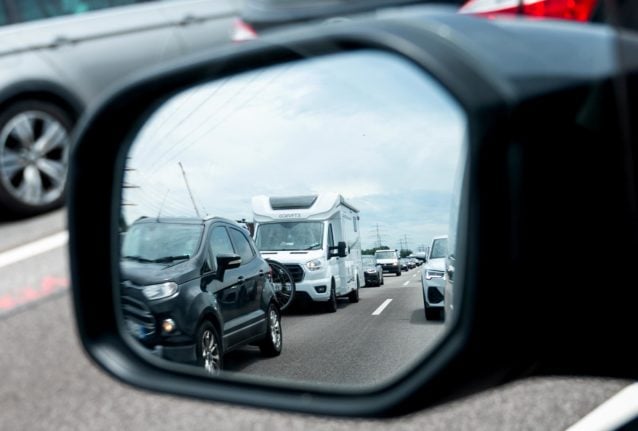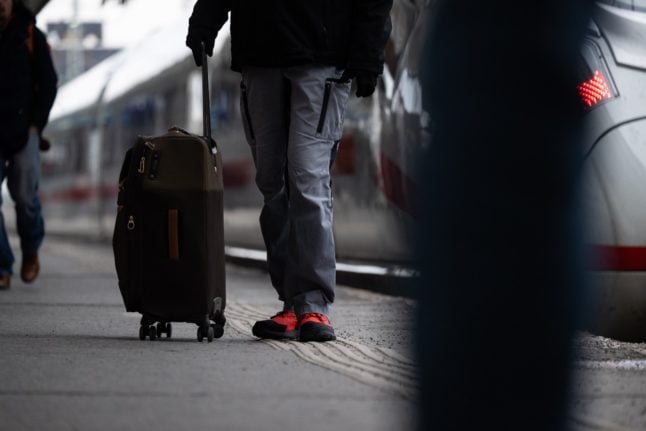By the time the second weekend in July arrives, nine states around Germany will have started their summer vacations. Children in Hesse, Rhineland-Palatine and Saarland all begin their breaks from schools from July 15th.
Earlier this month, schools in Germany’s most populous state of North Rhine-Westphalia also closed for the summer, while Bremen, Saxony, Saxony-Anhalt, Lower Saxony and Thuringia started their long vacations in June.
According to the German motorists’ association ADAC, this could spell significant delays for motorists this weekend, especially in routes towards the mountains, coasts and the south of Germany.
To make matters worse, much of the Netherlands and many other countries in northern Europe are also on their summer vacations and will likely be taking to the roads for family holidays or day-trips.
If the weather stays hot and sunny over the weekend, ADAC predicts there could be even more traffic on the road than usual, especially if people decide to head out on a spontaneous jaunt to the coast or Germany’s lake district.
READ ALSO: Five lesser known German summer destinations to visit this year
Where will the traffic be worst?
ADAC warns that the worst-hit areas will be motorway lanes that are undergoing construction over summer, especially places where the maintenance works are particularly extensive.
Return routes are also seeing increased traffic as many holidaymakers begin their journey home after a week or so away – particularly in those eastern and northern states that have been on holiday since late June.
ADAC lists a number of motorway routes and other roads that are likely to see a significant build-up of traffic this weekend:
- Major roads around Hamburg, Berlin, Cologne, and Munich
- Roads leading to the North and Baltic Seas
- The Cologne Ring (A 1/A 3/A 4)
- A1 from Cologne to Dortmund, Bremen, and Lübeck
- A2 from Dortmund to Hanover
- A3 from Oberhausen to Cologne, Frankfurt, Nuremberg, and Passau
- A5 from Frankfurt to Karlsruhe and Basel
- A6 from Mannheim to Heilbronn and Nuremberg
- A7 from Hamburg to Flensburg, and from Hamburg to Hanover, Würzburg, Ulm, and Füssen/Reutte
- A8 from Stuttgart to Munich and Salzburg
- A9 from Berlin to Nuremberg and Munich
- A24 from Berlin to Hamburg
- A45 from Hagen to Gießen and Aschaffenburg
- A61 from Mönchengladbach to Koblenz and Ludwigshafen
- A93 from Inntaldreieck to Kufstein
- A95/B2 from Munich to Garmisch-Partenkirchen
- A99 Munich bypass
In Bavaria, there will also be an exception to the usual ban on HGVs over the weekend to assist in flood relief and recovery efforts.
That means that lorries over 7.5 tonnes are likely to be out on the road on Sunday, though the summer ban will persist on all Saturdays from July 1st to August 31st between 7am and 8pm.
Will the final match of Euro 2024 have an impact?
On Sunday, July 14th, football fans will be flocking to the capital to see the final of the month-long Euro 2024 tournament in the afternoon. This influx of visitors is likely to have a knock-on effect on traffic and public transport both in and around Berlin.

Germany has also tightened up its border controls for the duration of the tournament, meaning that there could be additional delays when entering and leaving Germany.
In particular, motorists should anticipate stationary checks in Poland, the Czech Republic, and Switzerland, leading to a build-up of traffic when heading east or south. For drivers heading on a long road-trip towards Turkey or Greece, major delays are expected.
READ ALSO: How you can watch the Euro 2024 tournament in Germany
What about Germany’s neighbouring countries?
Unfortunately for drivers, traffic doesn’t end at national borders, and there are likely to be far more cars on the roads in popular tourist routes around Europe.
ADAC predicts that motorists will need some extra reserves of patience on popular mountain routes such Tauern, Fernpass, Inntal, Brenner, Phyrn, and Gotthard, as well as roads leading to the Italian, French, and Croatian coasts.
Unfortunately, those heading north towards Scandinavia won’t get off scot-free, as big delays are also expected towards Denmark and Sweden.
In Austria, the Arlberg Tunnel is closed for the entire travel season, requiring drivers to detour via the Arlberg Pass.
In Tyrol, meanwhile, weekend and holiday-traffic diversion routes designed to offer relief on congested areas are set to be closed until October. However, there is one positive, as the construction works around the Golling-Werfen tunnel on the Tauern Autobahn that have caused delays for months are set to be paused over summer.
In Switzerland, the A13 San Bernardino route, previously closed between Thusis and Bellinzona due to severe weather, will reopen with one lane in each direction from July 5th, but traffic jams are still likely.
How can motorists steer clear of the jams?
If you’re hoping to avoid the worst of the traffic and have more of a flexible schedule, it may be worth reconsidering when you travel: peak times for traffic over the weekend are Friday afternoon, Saturday morning, and Sunday afternoon, while Tuesday to Thursday tend to be relatively relaxed.
Of course, despite the well-known issues with Deutsche Bahn, taking the train could also be a quicker and less stressful option. Just be sure to check any changes to your routes due to construction works and schedule amendments over summer.
READ ALSO: What to know about Deutsche Bahn’s summer service changes



 Please whitelist us to continue reading.
Please whitelist us to continue reading.
Member comments